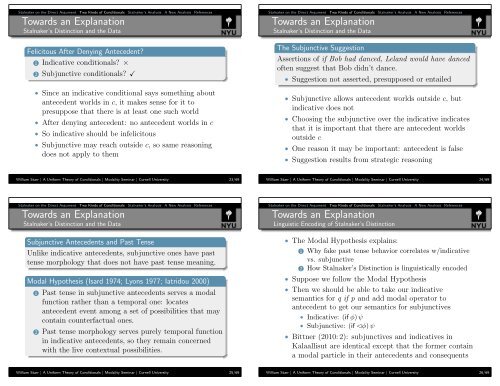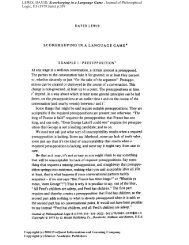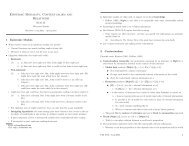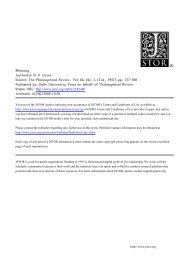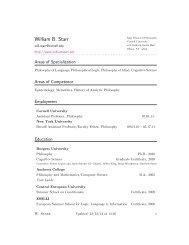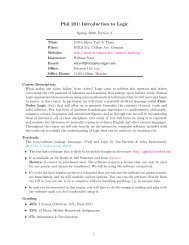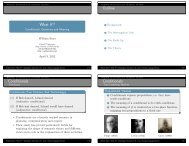A Uniform Theory of Conditionals: Beyond Stalnaker - Will Starr
A Uniform Theory of Conditionals: Beyond Stalnaker - Will Starr
A Uniform Theory of Conditionals: Beyond Stalnaker - Will Starr
Create successful ePaper yourself
Turn your PDF publications into a flip-book with our unique Google optimized e-Paper software.
<strong>Stalnaker</strong> on the Direct Argument Two Kinds <strong>of</strong> <strong>Conditionals</strong> <strong>Stalnaker</strong>’s Analysis A New Analysis References<br />
Towards an Explanation<br />
<strong>Stalnaker</strong>’s Distinction and the Data<br />
Felicitous After Denying Antecedent?<br />
1 Indicative conditionals? ×<br />
2 Subjunctive conditionals? ̌<br />
• Since an indicative conditional says something about<br />
antecedent worlds in c, it makes sense for it to<br />
presuppose that there is at least one such world<br />
• After denying antecedent: no antecedent worlds in c<br />
• So indicative should be infelicitous<br />
• Subjunctive may reach outside c, so same reasoning<br />
does not apply to them<br />
<strong>Stalnaker</strong> on the Direct Argument Two Kinds <strong>of</strong> <strong>Conditionals</strong> <strong>Stalnaker</strong>’s Analysis A New Analysis References<br />
Towards an Explanation<br />
<strong>Stalnaker</strong>’s Distinction and the Data<br />
The Subjunctive Suggestion<br />
Assertions <strong>of</strong> if Bob had danced, Leland would have danced<br />
<strong>of</strong>ten suggest that Bob didn’t dance.<br />
• Suggestion not asserted, presupposed or entailed<br />
• Subjunctive allows antecedent worlds outside c, but<br />
indicative does not<br />
• Choosing the subjunctive over the indicative indicates<br />
that it is important that there are antecedent worlds<br />
outside c<br />
• One reason it may be important: antecedent is false<br />
• Suggestion results from strategic reasoning<br />
<strong>Will</strong>iam <strong>Starr</strong> | A <strong>Uniform</strong> <strong>Theory</strong> <strong>of</strong> <strong>Conditionals</strong> | Modality Seminar | Cornell University 23/69<br />
<strong>Will</strong>iam <strong>Starr</strong> | A <strong>Uniform</strong> <strong>Theory</strong> <strong>of</strong> <strong>Conditionals</strong> | Modality Seminar | Cornell University 24/69<br />
<strong>Stalnaker</strong> on the Direct Argument Two Kinds <strong>of</strong> <strong>Conditionals</strong> <strong>Stalnaker</strong>’s Analysis A New Analysis References<br />
Towards an Explanation<br />
<strong>Stalnaker</strong>’s Distinction and the Data<br />
Subjunctive Antecedents and Past Tense<br />
Unlike indicative antecedents, subjunctive ones have past<br />
tense morphology that does not have past tense meaning.<br />
Modal Hypothesis (Isard 1974; Lyons 1977; Iatridou 2000)<br />
1 Past tense in subjunctive antecedents serves a modal<br />
function rather than a temporal one: locates<br />
antecedent event among a set <strong>of</strong> possibilities that may<br />
contain counterfactual ones.<br />
2 Past tense morphology serves purely temporal function<br />
in indicative antecedents, so they remain concerned<br />
with the live contextual possibilities.<br />
<strong>Stalnaker</strong> on the Direct Argument Two Kinds <strong>of</strong> <strong>Conditionals</strong> <strong>Stalnaker</strong>’s Analysis A New Analysis References<br />
Towards an Explanation<br />
Linguistic Encoding <strong>of</strong> <strong>Stalnaker</strong>’s Distinction<br />
• The Modal Hypothesis explains:<br />
1 Why fake past tense behavior correlates w/indicative<br />
vs. subjunctive<br />
2 How <strong>Stalnaker</strong>’s Distinction is linguistically encoded<br />
• Suppose we follow the Modal Hypothesis<br />
• Then we should be able to take our indicative<br />
semantics for q if p and add modal operator to<br />
antecedent to get our semantics for subjunctives<br />
• Indicative: (if φ) ψ<br />
• Subjunctive: (if ✁φ) ψ<br />
• Bittner (2010: 2): subjunctives and indicatives in<br />
Kalaallisut are identical except that the former contain<br />
a modal particle in their antecedents and consequents<br />
<strong>Will</strong>iam <strong>Starr</strong> | A <strong>Uniform</strong> <strong>Theory</strong> <strong>of</strong> <strong>Conditionals</strong> | Modality Seminar | Cornell University 25/69<br />
<strong>Will</strong>iam <strong>Starr</strong> | A <strong>Uniform</strong> <strong>Theory</strong> <strong>of</strong> <strong>Conditionals</strong> | Modality Seminar | Cornell University 26/69


